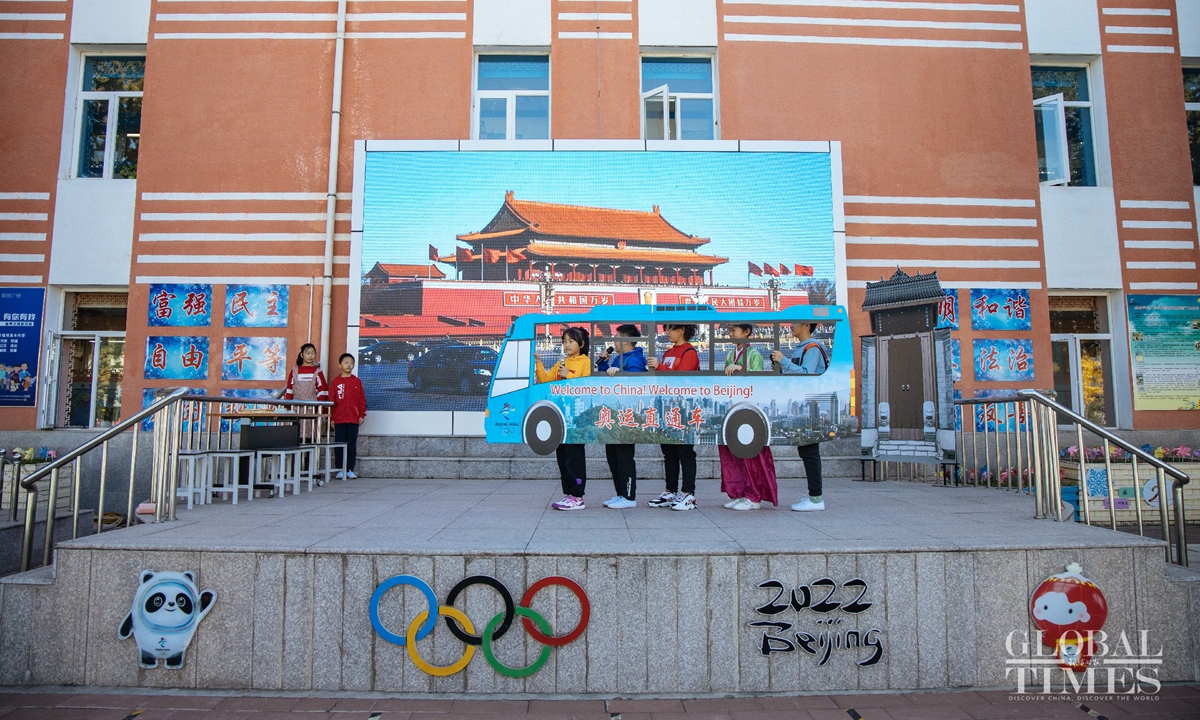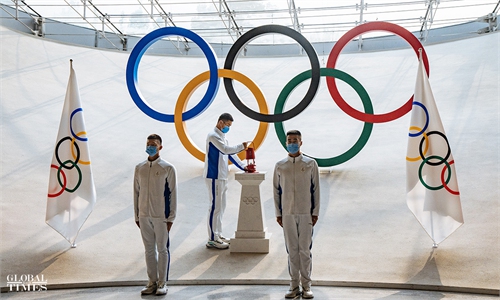Beijing Winter Olympics fully prepared for cold waves, as artificial snowmaking meets low-carbon standards

Students play winter sports to celebrate upcoming 2022 Beijing Winter Olympics Photo:Li Hao/GT
As the city of Beijing is expected to experience one of the coldest winters ever this year, which could be subject to other weather extremes, Beijing Winter Olympics meteorological security researchers said the organizing committee has prepared for various weather conditions to ensure that the outdoor events will not be affected by sudden weather extremes.
For the outdoor events during the Games, there will be artificial snowmaking to provide athletes with the most suitable snow environment. Insiders said that the entire process will strictly comply with low-carbon, clean and green standards, and that concerns about the energy consumption of snowmaking are unfounded.
In Beijing, this winter's first major snowfall came 23 days earlier than usual, as a severe cold wave hit many parts of China over the weekend with heavy snowfalls and plunging temperatures.
Meteorologists said the climate phenomenon known as La Nina brought the unusually early snow. Many in this field believe that due to La Nina and changes in the atmospheric circulation, the northern parts of China are likely to experience an extremely cold winter, including the host cities of the 2022 Winter Olympics, Beijing and Zhangjiakou, North China's Hebei Province.
Extreme weather or cold waves will not have an impact on preparations for the Winter Olympics, as a special weather protection team has already prepared for this, Wang Gengchen, head of the research team on Beijing Winter Olympics meteorological security, told the Global Times on Monday.
Most of the meteorological support staff are on duty and have started testing the event's meteorological security program at the race course, Wang said.
"The weather department feels tense about the potential extreme weather this winter, but we are confident because it has already previewed almost every situation."
Taking advantage of the latest snowfall, the Yanqing zone of the Beijing 2022 Olympic Winter Games held a drill on transferring injured athletes using ambulances on Sunday morning, in preparation for the emergency rescue of athletes in extreme weather during the Games. Ambulances will perform major tasks when helicopters cannot operate in extreme weather.
Wang, who is also a research fellow at the Institute of Atmospheric Physics of the Chinese Academy of Sciences, told the Global Times that as the first ever Winter Olympic Games to be held in a continental climate region, the meteorological security of the Beijing Winter Olympics faces unprecedented challenges.
Unlike other host cities, the venues for the 2022 Winter Olympics will be spread over three competition areas - Beijing, its suburban Yanqing district, and Zhangjiakou. That also means that there will be an increase in the number of weather conditions to deal with and possible unexpected weather extremes, Wang said.
"In particular, many of the venues in the Yanqing area are at high altitudes and located in mountainous terrain, which greatly increases the difficulty of weather forecasting and coverage."
The Beijing Winter Olympic Organizing Committee has its own way of dealing with these challenges.
"In order to cope with the climatic phenomena unique to Beijing's winter, the meteorological security team started its research very early on, summarizing the experiences of Sochi and Pyeongchang," Wang said.
"With the support of government departments, including the Ministry of Science and Technology, a large number of meteorological scenario studies were done, and unprecedentedly high requirements for detailed weather forecasting were put forward."
This detailed forecasting team is managed by the National Meteorological Administration and includes researchers, national weather forecasters and local meteorologists who know more about the weather in their cities and have undergone a lot of training.
Although Beijing may see its heaviest snowfalls this winter, the Beijing Winter Olympics will still use a large amount of artificial snow, because artificial snow is more in line with the requirements of the competition and safer for athletes.
Zhang Li, a member of the Beijing Winter Olympics bid delegation, pointed out that the artificial snowmaking technology used for the Beijing Winter Olympics will not pollute the environment.
"We will use a form of spray, based on water molecules, which itself is not polluting to the environment," Zhang said, adding that "the amount of water used for artificial snowmaking in places like Zhangjiakou, which accounts for less than 1 percent of the local water supply at the most, poses no threat to the water use of residents in the region."
Wang told the Global Times that the International Olympic Committee has strict requirements for the size, thickness, hardness and density of snow particles for competition, which cannot be achieved by natural snowfall.
"Artificial snowmaking is generally not susceptible to snowfall, but may be affected by the temperature and wind. In this regard, the Beijing Winter Olympics organizing committee has also made different plans."

